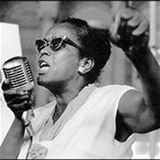
The New York Times is making a sincere and fairly effective effort to correct its serious missed-recognition of events and people (mostly women and people of color). One example of this is the publication of an Op-Ed piece about Ella Baker, a black woman who played as major a role in the Black Freedom Movement throughout the mid-20th century, including the Civil Rights Movement, as anyone. Her biographer, Barbara Ransby, beautifully captures the heart, mind, soul, and hands of Baker’s work in 1250 words. I highly recommend reading it. The quality and impact of her work is legendary, and she stands co-equal with MLK, and you, like most of us, probably don’t know that. Ransby’s 1250 words might take your breath away. (Even though the Times has a pay wall, they allow a few free visits per month.)

Here’s a taste that zeroes in how she grasped that the key to a democratic future lies with ordinary people empowering themselves and building grassroots organizations:
Throughout her life, [Ella] Baker insisted on the importance of grass-roots leadership. “Strong people don’t need a strong leader,” she declared, warning activists to eschew messiahs and saviors and build local leaders by the thousands. “Martin didn’t make the movement,” she said. Rather, “the movement made Martin.” She did not mean this to be a disparaging assessment but a hopeful one. The strength and determination of ordinary people and the power of the organizations they build together are the locus of the power that fuels change, power that is bigger than any one individual, no matter how charismatic or committed.
I especially appreciated what Dr. Ransby’s says about Ms. Baker’s role in building the Student Non-Violent Coordinating Committee (SNCC) and its role in building the Mississippi Freedom Democratic Party. The latter may be the most historic grassroots democratic uprising in the American 20th century.
Our columnist did not have the space—are you listening, Mr. and Ms. New York Times—to tell us about the dimension of personal transformation embedded in the SNCC project. From my viewpoint it was one of the most important and radical features of that project. I found out about Ms. Baker and her intense people-centered approach to organizing through Dr. Ransby’s biography as I was doing research for a book I am writing, Growing Democracy.
There is one bit in Ransby’s op-ed I take some exception to. She opens by using an analogy that Dr. King used in his Nobel speech:
…he observed that anytime an award is given to “the dedicated pilots of our struggle who have sat at the controls as the freedom movement soared into orbit,” the prize is also bestowed on “the ground crew without whose labor and sacrifices the jet flights to freedom could never have left the earth.”
Dr. Ransby goes on to say that Baker was “was a major part of that ground crew.” I think King’s notion of "dedicated pilots...at the controls" was and still is wrong from the ground-up. First, Baker was his equal as a co-pilot because she did work as essential as his. He could play a role she couldn't just as she played one he couldn't. Second, what Baker has passed on to us is a fundamental grasp that King's patriarchal notion of is a major obstruction to all forms of democratic organizing. Third, I think she also knew from here day-to-day experience over 50 years that this obstruction is embedded in our organizing efforts because we embody it in our very person. For example, the men of the male hierarchy of the Civil Rights Movement had a genuine commitment to democracy while at the same time not being able to understand why women like Ella Josephine Baker and Septima Clark were sitting in on their strategy meetings.

Add new comment